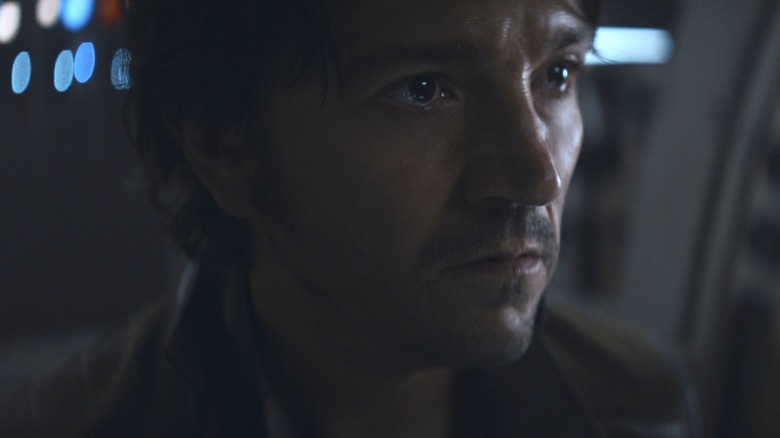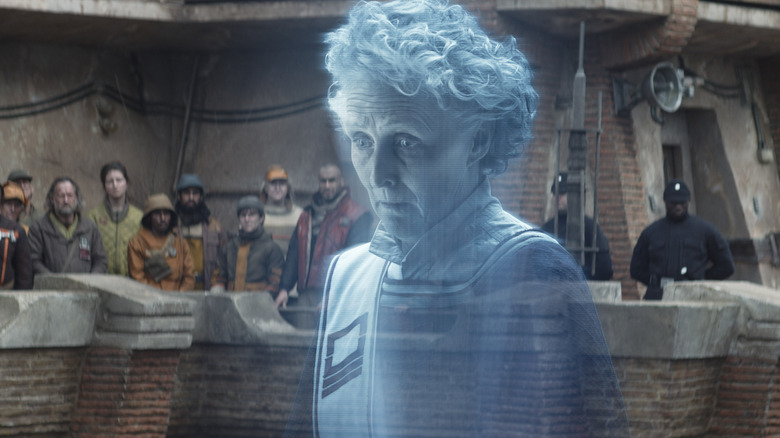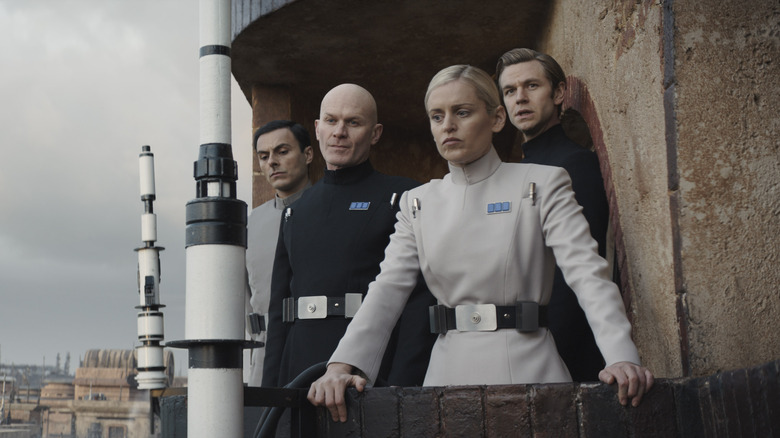Andor Director Benjamin Caron On His Approach To Directing The Star Wars Series [Exclusive]
Everyone and their mother has an opinion on "Star Wars," but nobody ever accused the franchise of being a simple and easy sandbox to play in. From George Lucas to Irvin Kershner to J.J. Abrams to Jon Favreau and the extended group of directors who've made their marks on the immensely successful property in movies or shows, none can claim that these talents had anything less than a universe of pressure and expectations foisted upon them. The long and winding road to Hollywood immortality is littered with ill-advised productions and overmatched filmmakers who floundered along the way, with "Star Wars" providing quite the cautionary tale — whether as a result of an overambitious filmmaker or studio interference or, well, simply lackluster storytelling instincts.
Putting one's own personal stamp on the galaxy far, far away is far from a sure thing ... but amid some high-profile failures, there are success stories like "Andor." The Diego Luna-starring prequel series ended up becoming one of the best and most compelling additions to "Star Wars" in the entire Disney era. Creator Tony Gilroy received the bulk of the accolades, but the 12-episode series provided all sorts of room for contributions from other sources, as well.
Director Benjamin Caron (BBC's "Sherlock," "The Crown") was entrusted with three pivotal episodes of "Andor," including the final two action-packed episodes of the first season. In an exclusive interview soon to be published on /Film, our very own Ben Pearson chatted with Caron ahead of the release of his feature film debut "Sharper." Of course, the topic of "Andor" eventually came up and Caron was all too happy to talk about his experience directing the acclaimed series.
'Look at the emotional weather of the script'
When it comes to fantasy and science fiction, storytellers sometimes need to find a unique approach to grounding the larger-than-life elements in something real and tangible. That goes double for those who may not necessarily be the biggest and most diehard fans of the given IP that they're involved in creating (which happens much more often than viewers may assume). Benjamin Caron obviously has preexisting knowledge of "Star Wars," but the name brand alone wasn't enough to draw him to a series as bold as "Andor." The real selling point, as it turns out, was Tony Gilroy's writing. As Caron told /Film's Ben Pearson:
"I was into 'Star Wars' when I was a kid, but I wasn't an obsessed 'Star Wars' fan, and I declared that to [Tony Gilroy]. But I responded to the writing and to Tony's writing. And my guiding principle is always to look at the emotional weather of the script and to focus on the anthropological strangeness of these people and find the uncomfortable stuff, the piece of gravel in the shoe and the emotional texture of the story that I can basically amplify through the visuals. That's the guiding principle that I use across everything."
Given the final results of those last two episodes (in addition to his directing work on episode 7, titled "Announcement"), it's clear Caron possessed the acumen to fit right into the world of "Star Wars" and fully make it his own. But while "Andor" may not boast the kind of epic scope and scale that the movies or shows like "The Mandalorian" enjoy, the gritty series still came with plenty of potential for distraction. For his part, Caron wanted to steer well clear of missing the forest for the trees.
'Directing is always about simplifying'
Remember watching "Andor" for the first time and immediately being drawn into the world expanded by Tony Gilroy and his team of writers and directors? The newly-introduced planet of Ferrix alone provided so much fascinating world-building that we've never really seen from "Star Wars" before, from that haunting funeral song to the panicked noise-making signals alerting residents of danger to the guy smashing hammers on an anvil to tell time. But according to Benjamin Caron, less was more when it came to his directing approach to the series. Later in the interview, he explained:
"For me, I've just learned that directing is always about simplifying. You throw everything in, it's always too much, and you just reduce it. You take everything away until you've got the bare minimum. That's all I could do on 'Andor.'
The other thing was, don't get overawed by the texture in these worlds. I really wanted you to feel that this universe, this planet, these communities, could totally exist. So don't fetishize the people of Ferrix. It is a working community of people, and they're going about their jobs. So allow your characters to breathe and travel through the thing, but don't fetishize that world. Just make it as believable and as tactile, so you can smell and taste it and inhale that world, while trying not to put it on a pedestal."
Well, that certainly goes a long way towards explaining why viewers responded so strongly to the finale. Treating the citizens of the town as regular people (as opposed to resorting to hero-worship) made their anti-fascist actions during the funeral-turned-riot feel that much more powerful. That's how you tell an emotional and involving story.
Stay tuned to /Film for the full interview with Caron ahead of the release of "Sharper."


